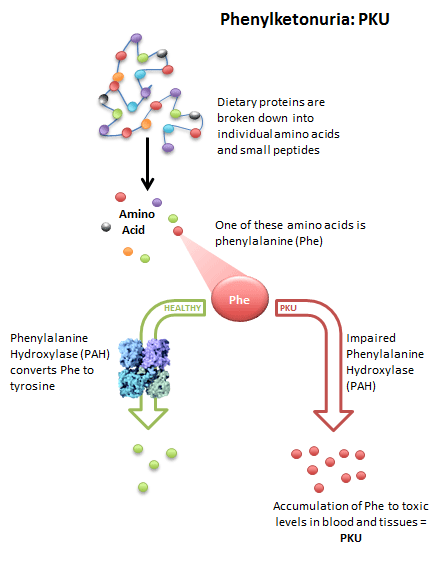Phenylketonuria
Phenylketonuria, commonly referred to as PKU, is a rare metabolic disorder. People with PKU cannot metabolize phenylalanine (Phe), an amino acid found in all kinds of dietary protein. If untreated, Phe builds up in the blood and tissues to levels causing irreversible brain damage and neurological complications including IQ loss, memory loss, seizures, learning disabilities, and emotional problems.
PKU can be diagnosed at birth and is commonly included in newborn screening programs in most high-income countries. All PKU affected newborns must immediately begin to follow a very strict, lifelong, low-protein diet. Consequently, people with PKU must abstain from eating high-protein food such as meat and fish, cheese and milk, beans and peas, egg, bread and pasta.
The burden of living with PKU to both individuals and society is immense. Many adults affected by PKU reduce their working hours, and parents report quitting their job to take care of a child with PKU. Cooking is complicated due to the dietary restrictions, and the special foods modified to be low in protein available to children and adults with PKU are expensive.
Travelling and dining out – activities which to most people are unproblematic – require substantial planning. And due to the stigma of not being able to eat a normal meal with friends and family, eating disorders and food phobias are well-known side-effects of PKU, particularly amongst adolescent patients.

PKU is caused by mutation in the phenylalanine hydroxylase (PAH) gene. PAH is an enzyme and it is needed to convert phenylalanine to tyrosine.
To provide the amino acids and other necessary nutrients lacking in a low-protein diet, PKU patients have to take “protein substitute” tablets, as many as up to 250 tablets per day per patient. Furthermore, regular blood tests are required to determine the Phe levels in their blood stemming from the fruits, vegetables and starchy foods such as potatoes and corn which many people with PKU tolerate in limited quantities.
PKU represents an unmet medical need affecting at least 50,000 diagnosed patients under the age of 40 years in North America and EU alone. MipSalus seeks to meet this need and has developed a drug called Phelimin which binds phenylalanine. When taken together with meals, people with PKU can eat normally. Ensuring a low level of Phe in the blood, Phelimin will thus significantly improve the quality of life and sense of freedom for the patient.
New proprietary drug – Phelimin
MipSalus is developing a new proprietary drug – the first in a new class of medicines – for the treatment of all variants of HPA (Hyperphenylalaninemia).
